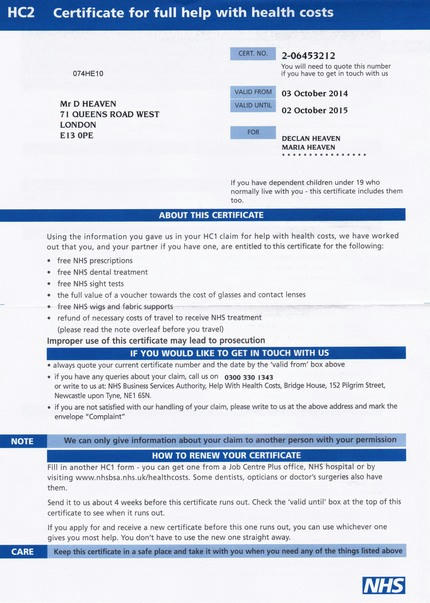If you are under surveillance check your NHS records (especially your surname!)
Invalid National Health Service (NHS) Certificate for full help with health costs:
Declan is currently updating his complaint to the United Nations under Article 19 (freedom of expression) of the International Covenant on Civil and Political Rights. This is his revised paragraph 12 concerning discriminatory surveillance: nothing to hide, nothing to fear?
12. It is important to underscore that the discriminatory surveillance suffered by the Applicant and his wife is not an isolated event. Rather, it is emblematic of a larger pattern of surveillance by law enforcement officials in the UK that has been well-documented by international and domestic human rights bodies. In May 2012 Liberty, one of the UK's leading civil liberties and human rights organisations, expressed concern that "state sanctioned surveillance against specific individuals takes place on a massive scale". British police and government agencies are requesting personal information about Facebook users more than almost anywhere else in the world (behind the USA and India), according to the company's Government Requests Report 2013. Since the Guardian began publishing material leaked by US whistleblower Edward Snowden in June 2013, there have been a spate of top secret GCHQ documents reported on and published around the world. On 19 February 2014 Intercept journalist Glenn Greenwald, through whom Snowden's revelations came to the world, listed some of these documents: "They include detailed reports on GCHQ's attempts to compromise basic encryption methods used to safeguard internet security, the GCHQ's role in spying on the Brazilian oil company Petrobras, the GCHQ's targeting of UN charities and officials, the GCHQ's use of 'dirty tricks' including 'honeytraps' and fake victim blog posts, the GCHQ's attacks on 'hactivists', GCHQ's surveillance of YouTube and Blogger activity and related activities to covertly influence internet discourse, GCHQ's surveillance through phone apps such as 'Angry Birds', and GCHQ's covert monitoring of visitors to the WikiLeaks website." In February 2014, the Independent reported that GCHQ's online covert actions follow the "4 D's": deny, disrupt, degrade, deceive. Privacy groups have now commenced lawsuits against GCHQ for the use of malware to spy on mobile and internet users across the UK.


